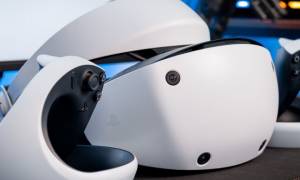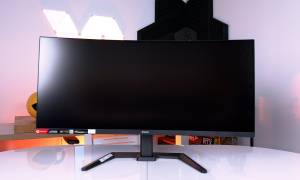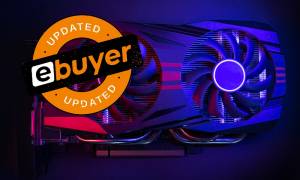This blog was updated in December.
- Gaming laptops can be expensive, a gaming desktop gets you more performance for the money.
- If you keep an eye out, however, there are amazing deals to be had on gaming laptops.
- A gaming desktop is always going to be faster than a laptop, but a gaming laptop’s performance is impressive for its portable form-factor.
- Laptop GPUs and desktop GPUs of the same name aren’t equal, and each model of gaming laptop sends varying amounts of power to the GPU. This makes purchasing a gaming laptop surprisingly tricky.
- Gaming laptops are prone to overheating.
- Those trade-offs are worth it if you need a portable gaming device, a gaming desktop can’t compete in this regard.
- It might be worth considering a gaming desktop and a cheap laptop, as opposed to a gaming laptop.
Gaming Laptop Price
For many, the biggest strike against a gaming laptop is the price. Let’s say you have a gaming laptop and a gaming desktop, each of an identical spec. The exact same CPU, GPU, and so on. Despite this, it’d be safe to assume that the gaming laptop demands a considerably higher price tag. And that’s assuming it’s going up against the price of a pre-built desktop. You’d save even more money if you went down the DIY route and built your own PC having sourced each component at their best prices.
Buy a Gaming Desktop & Cheap, Non-Gaming Laptop?
So much so, that the money you’d save might be enough to pick up a non-gaming laptop separately. Whenever someone poses the question online of whether they should buy a gaming laptop or not, this is the advice they’re always inundated with.
Unless a user will take full advantage of a gaming laptop’s portable form-factor (say, you regularly travel for work), they shouldn’t buy a gaming laptop. Rather, they should build their own high-spec PC for gaming at home, then buy a non-gaming laptop separately for on-the-go computing. In total, this should come out at roughly the same price as just a gaming laptop.
It’s an option you might want to consider as, realistically, a gaming laptop isn’t that great unless it’s hooked up to a power outlet. At which point it might as well be a gaming desktop! Gaming laptops don’t make for the best portable devices as they’re heavier and bulker than your average thin-and-light laptop. They’ve got to keep desktop-grade hardware cool, after all.
Nor do they compare favourably to a dedicated gaming handheld, like the Steam Deck or Nintendo Switch. These devices leverage low-TDP chips, sipping back 15W of power at most. Whereas the mobile version of NVIDIA’s RTX 3060 consumes 115W alone. Consequently, most gaming laptops barely last more than an hour when gaming off-charge, and that’s even when they’re dropping clocks severely to help preserve battery life. You’re only going to get a fraction of your gaming laptop’s performance when it’s running off battery.
Gaming Laptop Deals
Sometimes it’s not so cut and dry. Yes, gaming laptops are on average more expensive than their gaming desktop counterparts. When it comes to price, however, gaming laptops can have a couple of points in their favour.
For one, a gaming laptop is shipped right to your door as one whole unit, including a display, keyboard, webcam, and more. You’ve got to factor these into the price of a gaming laptop. Compared to building your own PC, you won’t have to spend time validating each component’s compatibility either. It’s good to go right out of the box, no assembly required. As it saves time and a potential headache, the price premium of a gaming laptop might be worth it to some.
You’ve also got to consider sales on gaming laptops. Whenever a new model releases, or there’s a big sale event, you can expect a hefty discount. You don’t tend to see such steep discounts on components.
Gaming Laptop Performance
While the gap is shrinking with each component generation, a gaming desktop will always be faster than a gaming laptop of the same spec. There’s just no getting around the fact that a desktop PC has more power and cooling potential to work with.
For example, take NVIDIA’s new RTX 4090. This card alone is rated for a total board power of 450W, with most board partners recommending a 1,000W PSU to a power a whole RTX 4090-equipped PC. Push that much wattage through a gaming laptop and it’d explode. Although it’s a last-gen chip, the fastest mobile GPU (the RTX 3080 Ti Mobile) is rated for up to 150W in comparison.
Laptop vs Desktop GPUs
While on the topic of power consumption, an important distinction to make is that a mobile GPU is not comparable to a desktop GPU of the same name. Often, they don’t use the same chip at all, never mind factoring TDP and clock speed into the equation.
Here’s another example for you. The desktop RTX 3080 has 8,704 CUIDA Cores, 68 RT Cores, 272 Tensor Cores and 10GB of GDDR6X memory, with a total power of 320W. On the other hand, the RTX 3080 Mobile has 6,144 CUDA Cores, 48 RT Cores, 192 Tensor Cores and 8GB of GDDR6 memory, at up to 150W. So, not only is the mobile GPU consuming less than half the power of the desktop GPU, it’s not even the same chip. Is it really fair to call it an “RTX 3080” at that point?
Max-Q, Max-P, and more
Notice how we said the RTX 3080 Mobile is rated at “up to” 150W. That’s another thing you’ve got to look out for when buying a gaming laptop. Multiple versions of the same GPU exist, except with different TDPs. For example, you could have two “RTX 3080-powered” gaming laptops, but one’s rated for just 80W, while the other’s got the full 150W version. This results in a huge performance disparity, despite them both having RTX 3080s on the box.
It’s not communicated clearly by laptop vendors either. NVIDIA used to have the ‘Max-Q’ (Max Quiet) and ‘Max-P’ (Max Performance) naming schemes to delineate between GPU versions, but it’s been slowly phased out. Most of the time, you’ll just see RTX 3080 on a product’s spec-sheet, with no reference to its wattage. So, it’s up to the user to consult user-made charts, spreadsheets, and reviews to understand a laptop’s full spec. As you can’t assume that one RTX 3080 gaming laptop will perform like another, purchasing a gaming laptop can be quite confusing.
Gaming Laptop Overheating

Squashing such high-performance hardware into a chassis as small as a gaming laptop makes it prone to overheating. Don’t worry, even though they get hot, the hardware won’t damage itself. There are procedures in place to keep temperatures in check when a component approaches its thermal limit, such as dynamic frequency scaling.
This is also known as ‘thermal throttling’, and it’s when a component’s clock speed is reigned in until it reaches a safe, sustainable temperature. This improves temperatures at the cost of performance.
Throttling can also occur on desktop hardware. The problem, however, is how easily and frequently it occurs on gaming laptops. In a portable form-factor, gaming laptops simply don’t have enough thermal mass to withstand a high temperature for long and are soon overwhelmed. Load up a hardware-intensive game on a gaming laptop and it’ll hit 95°C in minutes and trigger thermal throttling.
You can ramp up the fan RPM and pick up a cooling pad to mitigate temperatures, but it won’t make much of a dent. Whereas a gaming desktop that’s equipped with a high-airflow case, an all-in-one liquid cooler and a three-slot/three-fan graphics card can run comfortably at high boost clocks and low temperatures.
Gaming Laptop Portability
You make compromises to price and performance with a gaming laptop, that much is clear. However, you can’t get a gaming laptop’s portable form-factor on a gaming desktop. A gaming laptop is more expensive and won’t be as fast, but for many, the simple convenience of a portable device reigns supreme over anything else.
You’ve got to consider how much you’ll end up taking advantage of a gaming laptop’s portability, and whether it’s worth these trade-offs. If you go round a mate’s house every weekend for a LAN party, or you regularly travel for work, then of course a gaming laptop makes sense. Or perhaps you’re a uni student who doesn’t want to leave their gaming PC behind at the end of term. It’s way easier to bring a gaming laptop home – just chuck it in a backpack.
These are ideal scenarios for a gaming laptop, ones where the higher prices and lower performance are worth it. If you know you’re going to be on the road a lot and want a high-end gaming experience wherever you go, the portability of a gaming laptop becomes invaluable.
That’s not to say you can’t transport a gaming desktop, especially one with a Micro-ATX or Mini-ITX computer case. But it’s far from convenient and requires some prep to ensure things aren’t jostled loose during transport. You don’t want a weighty, three-slot graphics card to rip out of and damage your motherboard’s PCIe socket, for example.
A gaming laptop is an extremely versatile, all-in-one device. It not only includes gaming-grade hardware in a portable form-factor, but a built-in monitor, keyboard, touchpad, and a wealth of I/O too.
A desktop set-up can’t compete with that. Even when you’re not out and about, the portability of a gaming laptop comes in handy around the home. Say, if you want to kick back with a wireless controller and play games on your big-screen TV for a change. A gaming laptop can be easily unplugged and hooked up again to your TV in minutes.
Gaming Laptop Upgrades and Repairs
Chasing the slimmest profile, more and more thin-and-light laptops are moving towards non-upgradable components, such as having RAM soldered directly to the laptop’s mainboard. As they’re on the thicker side, most gaming laptops haven’t gone down this route. Most models still have user-accessible DIMM slots for memory upgrades and SATA/M.2 slots for storage upgrades. If you want a degree of upgradability on your laptop, even if it’s a small one, then a gaming laptop might be your best choice nowadays.
However, a gaming laptop is nowhere near as upgradable as a gaming desktop. Core components, like the graphics card, aren’t upgradable on a gaming laptop. When a component is starting to show its age on a gaming desktop, you don’t have to throw the whole PC out and buy and new one. You can add to it over time: upgrade from the stock cooler to an aftermarket one, swap out the GPU for a faster model, replace a faulty fan, and so on. In comparison, a gaming laptop’s upgrade path is cut quite short, ending at just RAM and HDD/SDD upgrades.
Warranties
As a gaming laptop is produced by a single manufacturer, you have one point of contact for all your support queries, returns, and repairs. This makes the process as straightforward as possible. If you’ve got a problem with your gaming laptop, just get in touch with the laptop’s manufacturer. It’s not so simple if you build your own PC, as each component in a system could be the source of the problem.
It’s a two-sided coin however. If one thing is wrong on your gaming laptop, you have to send the whole device away for repair. This leaves you without your PC for an undetermined amount of time. Where’s it being shipped to, how long will it take to return? At least on a gaming desktop, if you know it’s just the graphics card that’s faulty, you can send just the card away for repair and continue to use your PC with the CPU’s iGPU, for example.
And that’s assuming your laptop is under warranty still. If your laptop goes awry outside of it, your options for repair are limited. Either you pay for an expensive out-of-warranty manufacturer repair, take it to a third-party repair shop, or scour the internet for replacement pairs and do it yourself.
With a gaming laptop, it’s considerably harder to replace something even as trivial as a fan. It’s not as if you can go to a large retailer like Ebuyer and pick up any old case fan. You’ll have to find and buy the exact model number of fan used in your laptop. And when a core component like the GPU bites the dust, it’s pretty much game over for the entire laptop.
Gaming Laptops at Ebuyer
Compared to a gaming desktop the portability of a gaming laptop is unmatched, but you do make compromises to performance, temperatures, and more. If you truly want a portable, high-end gaming machine, then go for a gaming laptop. After all, it’d be wasteful to recommend a gaming desktop to someone who’s not even going to be home to use it. Otherwise, we reckon most people would be better suited by a gaming desktop. If they need a portable computer too, they should buy a non-gaming laptop separately.
If you’re looking for a gaming laptop, check out our blogs What to look for in a budget gaming laptop, What to look for in a high-end gaming laptop, and Is a gaming laptop worth it?



























